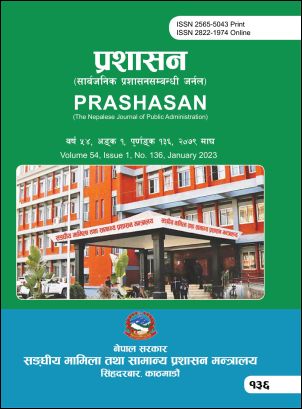Exploring the Negotiation Strategy of Nepal at World Trade Organization
DOI:
https://doi.org/10.3126/prashasan.v54i1.53222Keywords:
Trade Negotiation, Economic Diplomacy, Foreign Direct Investment, LDCsAbstract
The Political Economy of neo-liberalization is supposed to benefit countries that adopted liberal trade policies. As the key driver, the World Trade Organization (WTO) establishes the minimum requirements for numerous agreements on goods, services, intellectual property, trade facilitation, and development elements of international trade. These agreements provide special and differential provisions for the Least Developed Countries (LDCs) and developing countries to be benefited from trade liberalization. This study analyzes the effectiveness of Nepal's economic diplomacy; particularly its negotiation strategy in various WTO agendas. This study finds that WTO agreements help emerging developing nations in improving their trade performance and attract foreign direct investment where Nepal and many other LDCs are performing weaker roles in trade negotiation resulting in a lower level of trade and investment. Therefore, this study offers some recommendations for fostering economic trade negotiation aspects of economic diplomacy.
Downloads
Downloads
Published
How to Cite
Issue
Section
License
- The copyright of published materials of the journal remains with Ministry of Federal Affairs and General Administration.
- The published article cannot be reproduced or copied commercially by any person or institution but it can be used non-commercially for academic, research and training purpose providing proper citation is given.




